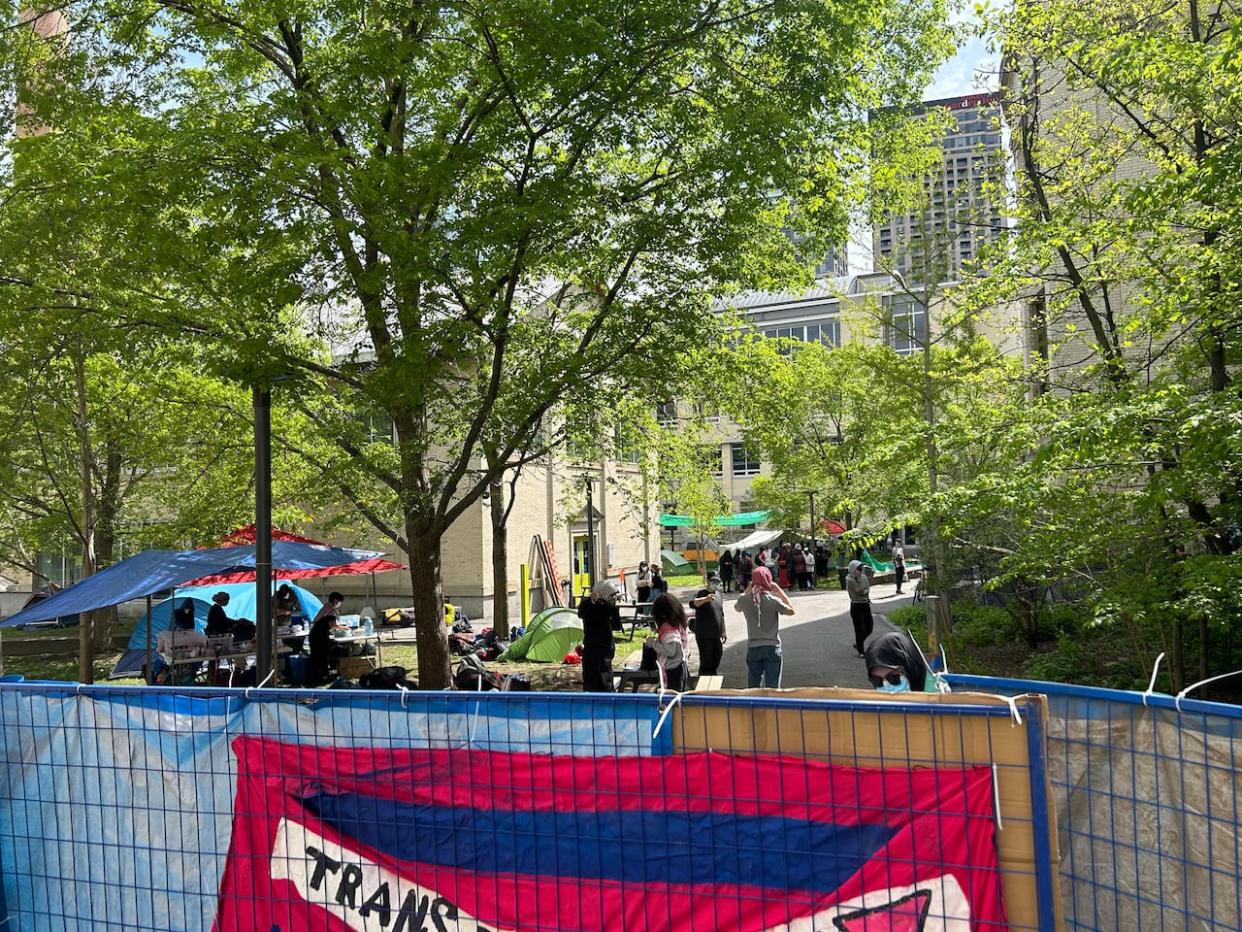UQAM rector threatens encampment with injunction request after clashes with police

A clash between police and pro-Palestinian protesters near an encampment set up on the campus of the Université du Québec à Montréal (UQAM) this weekend prompted the university to raise concerns about its presence.
In a statement Monday, UQAM rector Stéphane Pallage said the encampment, which went up May 12 in solidarity with a similar camp at McGill University, was "increasingly barricaded" and that protesters wearing hoods and dressed in black had been "intimidating" those who approached the camp.
Pallage called the situation worrying and noted three access points to nearby buildings have been blocked by students protesters, and said the university would file an injunction request if it persists.
Sunday, videos were posted to social media accounts run by student activists of Montreal police in riot gear advancing on protesters on Président-Kennedy Avenue near the courtyard of UQAM's science department where the encampment has been set up.
Police can be seen rushing the group of protesters with their shields and hitting them with batons.
In the social media posts, activists wrote that they had been attempting to "form a political and festive 'temporary zone of autonomy' for a liberated Palestine" on the street when police attacked them.
"Demonstrators were pepper-sprayed, tear-gassed and bludgeoned into the inner courtyard of the Complexe des sciences," the post on the account run by Solidarité pour les droits Humains des Palestiniennes et Palestiniens (SDHPP-UQAM) said, noting several people sustained head and facial injuries.
"The SPVM's immediate crackdown, with no notice to disperse, is part of a worldwide trend of brutal repression of the pro-Palestinian movement," it added.
'No investment in armaments'
The police response stands in contrast to the relatively passive approach they have taken with the UQAM and McGill encampments so far.
Police spokesperson Cst. Sabrina Gauthier said Monday that officers had asked protesters to leave the street "and they didn't cooperate, so that's why everything happened, but nobody was injured and there were no criminal arrests."
The pro-Palestinian encampment at McGill University was erected April 27 and is still in place despite two requests for court orders to have student activists removed, both of which were rejected by two Quebec Superior Court judges.
Protesters at McGill have called on the university to divest from companies with ties to Israel and cut ties with Israeli academic institutions.
The encampment at UQAM backs up those demands. Shortly after tents went up on its campus, the university released a statement saying its foundation "has no investment in armaments, having adopted a responsible investment policy many years ago, nor does it have any mobility or framework agreements with Israeli universities."
In his statement Monday, Pallage said the UQAM encampment appears to have been infiltrated by groups whose objectives go beyond defending the Palestinian cause.
"Yesterday, after blocking the corner of Saint-Urbain Street and Président-Kennedy Avenue, around 30 of these hooded people erected a new barricade with wooden pallets. This is not acceptable in a university," Pallage wrote.
He said he met with four people representing the camp on Friday and reminded them of the importance that all building entrances be accessible and that they create a safe environment for everyone on site. The university would be seeking a court injunction to have the encampment dismantled if those conditions are not met, Pallage said.
"Four days later, the situation on these two points has deteriorated," he said.
"The University is seeking a peaceful end to this encampment, but can only do so if the occupants themselves want peace. I am no longer very sure of that today."

